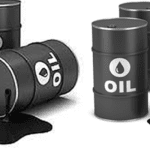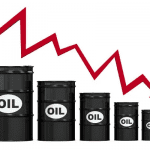Nigeria’s crude oil output reached an all-time high of 1.35 million barrels per day in September 2023, the country’s greatest level since this year.
According to the most recent data from the Nigerian Upstream Petroleum Regulatory Commission (NUPRC), the country’s output in September was nearly 14% more than in the preceding month of August 2023.
According to data from the commission, Nigeria’s crude oil output (excluding condensates) was precisely 1,346,562 barrels per day in September, representing a 165,429bpd increase over the 1,181,133bpd produced in August of this year.
Further examination of NUPRC data revealed that the country’s oil outputs in January, February, and March were 1,266,659bpd, 1,292,240bpd, and 1,266,737bpd, respectively.
In the months of April, May, June and July, Nigeria produced 1,004,392bpd; 1,189,332bpd; 1,260,928bpd; and 1,089,089bpd respectively.
The above crude oil production figures therefore showed that Nigeria’s oil production in September was the highest output so far recorded by the country this year.
The Federal Government has been making concerted efforts to shore-up the country’s oil production, which is far below the about 1.8 million barrels per day quota approved for Nigeria by the Organisation of Petroleum Exporting Countries.
In a related event, the NUPRC expressed great optimism that the asset transaction from Exxon Mobil to Seplat Energy may proceed.
Gbenga Komolafe, the CEO of NUPRC, revealed this in Cape Town during Africa Oil Week.
The $1.28 billion sale, which some in the industry said was crucial to attracting much-needed investment into Nigeria’s oil and gas sector, was rejected by the regulator last year.
Nigeria’s crude oil output reached an all-time high of 1.35 million barrels per day in September 2023, the country’s greatest level since this year.
According to the most recent data from the Nigerian Upstream Petroleum Regulatory Commission (NUPRC), the country’s output in September was nearly 14% more than in the preceding month of August 2023.
According to data from the commission, Nigeria’s crude oil output (excluding condensates) was precisely 1,346,562 barrels per day in September, representing a 165,429bpd increase over the 1,181,133bpd produced in August of this year.
Further examination of NUPRC data revealed that the country’s oil outputs in January, February, and March were 1,266,659bpd, 1,292,240bpd, and 1,266,737bpd, respectively.
In the months of April, May, June and July, Nigeria produced 1,004,392bpd; 1,189,332bpd; 1,260,928bpd; and 1,089,089bpd respectively.
The above crude oil production figures therefore showed that Nigeria’s oil production in September was the highest output so far recorded by the country this year.
The Federal Government has been making concerted efforts to shore-up the country’s oil production, which is far below the about 1.8 million barrels per day quota approved for Nigeria by the Organisation of Petroleum Exporting Countries.
In a related event, the NUPRC expressed great optimism that the asset transaction from Exxon Mobil to Seplat Energy may proceed.
Gbenga Komolafe, the CEO of NUPRC, revealed this in Cape Town during Africa Oil Week.
The $1.28 billion sale, which some in the industry said was crucial to attracting much-needed investment into Nigeria’s oil and gas sector, was rejected by the regulator last year.
Nigeria’s crude oil output reached an all-time high of 1.35 million barrels per day in September 2023, the country’s greatest level since this year.
According to the most recent data from the Nigerian Upstream Petroleum Regulatory Commission (NUPRC), the country’s output in September was nearly 14% more than in the preceding month of August 2023.
According to data from the commission, Nigeria’s crude oil output (excluding condensates) was precisely 1,346,562 barrels per day in September, representing a 165,429bpd increase over the 1,181,133bpd produced in August of this year.
Further examination of NUPRC data revealed that the country’s oil outputs in January, February, and March were 1,266,659bpd, 1,292,240bpd, and 1,266,737bpd, respectively.
In the months of April, May, June and July, Nigeria produced 1,004,392bpd; 1,189,332bpd; 1,260,928bpd; and 1,089,089bpd respectively.
The above crude oil production figures therefore showed that Nigeria’s oil production in September was the highest output so far recorded by the country this year.
The Federal Government has been making concerted efforts to shore-up the country’s oil production, which is far below the about 1.8 million barrels per day quota approved for Nigeria by the Organisation of Petroleum Exporting Countries.
In a related event, the NUPRC expressed great optimism that the asset transaction from Exxon Mobil to Seplat Energy may proceed.
Gbenga Komolafe, the CEO of NUPRC, revealed this in Cape Town during Africa Oil Week.
The $1.28 billion sale, which some in the industry said was crucial to attracting much-needed investment into Nigeria’s oil and gas sector, was rejected by the regulator last year.
Nigeria’s crude oil output reached an all-time high of 1.35 million barrels per day in September 2023, the country’s greatest level since this year.
According to the most recent data from the Nigerian Upstream Petroleum Regulatory Commission (NUPRC), the country’s output in September was nearly 14% more than in the preceding month of August 2023.
According to data from the commission, Nigeria’s crude oil output (excluding condensates) was precisely 1,346,562 barrels per day in September, representing a 165,429bpd increase over the 1,181,133bpd produced in August of this year.
Further examination of NUPRC data revealed that the country’s oil outputs in January, February, and March were 1,266,659bpd, 1,292,240bpd, and 1,266,737bpd, respectively.
In the months of April, May, June and July, Nigeria produced 1,004,392bpd; 1,189,332bpd; 1,260,928bpd; and 1,089,089bpd respectively.
The above crude oil production figures therefore showed that Nigeria’s oil production in September was the highest output so far recorded by the country this year.
The Federal Government has been making concerted efforts to shore-up the country’s oil production, which is far below the about 1.8 million barrels per day quota approved for Nigeria by the Organisation of Petroleum Exporting Countries.
In a related event, the NUPRC expressed great optimism that the asset transaction from Exxon Mobil to Seplat Energy may proceed.
Gbenga Komolafe, the CEO of NUPRC, revealed this in Cape Town during Africa Oil Week.
The $1.28 billion sale, which some in the industry said was crucial to attracting much-needed investment into Nigeria’s oil and gas sector, was rejected by the regulator last year.
Nigeria’s crude oil output reached an all-time high of 1.35 million barrels per day in September 2023, the country’s greatest level since this year.
According to the most recent data from the Nigerian Upstream Petroleum Regulatory Commission (NUPRC), the country’s output in September was nearly 14% more than in the preceding month of August 2023.
According to data from the commission, Nigeria’s crude oil output (excluding condensates) was precisely 1,346,562 barrels per day in September, representing a 165,429bpd increase over the 1,181,133bpd produced in August of this year.
Further examination of NUPRC data revealed that the country’s oil outputs in January, February, and March were 1,266,659bpd, 1,292,240bpd, and 1,266,737bpd, respectively.
In the months of April, May, June and July, Nigeria produced 1,004,392bpd; 1,189,332bpd; 1,260,928bpd; and 1,089,089bpd respectively.
The above crude oil production figures therefore showed that Nigeria’s oil production in September was the highest output so far recorded by the country this year.
The Federal Government has been making concerted efforts to shore-up the country’s oil production, which is far below the about 1.8 million barrels per day quota approved for Nigeria by the Organisation of Petroleum Exporting Countries.
In a related event, the NUPRC expressed great optimism that the asset transaction from Exxon Mobil to Seplat Energy may proceed.
Gbenga Komolafe, the CEO of NUPRC, revealed this in Cape Town during Africa Oil Week.
The $1.28 billion sale, which some in the industry said was crucial to attracting much-needed investment into Nigeria’s oil and gas sector, was rejected by the regulator last year.
Nigeria’s crude oil output reached an all-time high of 1.35 million barrels per day in September 2023, the country’s greatest level since this year.
According to the most recent data from the Nigerian Upstream Petroleum Regulatory Commission (NUPRC), the country’s output in September was nearly 14% more than in the preceding month of August 2023.
According to data from the commission, Nigeria’s crude oil output (excluding condensates) was precisely 1,346,562 barrels per day in September, representing a 165,429bpd increase over the 1,181,133bpd produced in August of this year.
Further examination of NUPRC data revealed that the country’s oil outputs in January, February, and March were 1,266,659bpd, 1,292,240bpd, and 1,266,737bpd, respectively.
In the months of April, May, June and July, Nigeria produced 1,004,392bpd; 1,189,332bpd; 1,260,928bpd; and 1,089,089bpd respectively.
The above crude oil production figures therefore showed that Nigeria’s oil production in September was the highest output so far recorded by the country this year.
The Federal Government has been making concerted efforts to shore-up the country’s oil production, which is far below the about 1.8 million barrels per day quota approved for Nigeria by the Organisation of Petroleum Exporting Countries.
In a related event, the NUPRC expressed great optimism that the asset transaction from Exxon Mobil to Seplat Energy may proceed.
Gbenga Komolafe, the CEO of NUPRC, revealed this in Cape Town during Africa Oil Week.
The $1.28 billion sale, which some in the industry said was crucial to attracting much-needed investment into Nigeria’s oil and gas sector, was rejected by the regulator last year.
Nigeria’s crude oil output reached an all-time high of 1.35 million barrels per day in September 2023, the country’s greatest level since this year.
According to the most recent data from the Nigerian Upstream Petroleum Regulatory Commission (NUPRC), the country’s output in September was nearly 14% more than in the preceding month of August 2023.
According to data from the commission, Nigeria’s crude oil output (excluding condensates) was precisely 1,346,562 barrels per day in September, representing a 165,429bpd increase over the 1,181,133bpd produced in August of this year.
Further examination of NUPRC data revealed that the country’s oil outputs in January, February, and March were 1,266,659bpd, 1,292,240bpd, and 1,266,737bpd, respectively.
In the months of April, May, June and July, Nigeria produced 1,004,392bpd; 1,189,332bpd; 1,260,928bpd; and 1,089,089bpd respectively.
The above crude oil production figures therefore showed that Nigeria’s oil production in September was the highest output so far recorded by the country this year.
The Federal Government has been making concerted efforts to shore-up the country’s oil production, which is far below the about 1.8 million barrels per day quota approved for Nigeria by the Organisation of Petroleum Exporting Countries.
In a related event, the NUPRC expressed great optimism that the asset transaction from Exxon Mobil to Seplat Energy may proceed.
Gbenga Komolafe, the CEO of NUPRC, revealed this in Cape Town during Africa Oil Week.
The $1.28 billion sale, which some in the industry said was crucial to attracting much-needed investment into Nigeria’s oil and gas sector, was rejected by the regulator last year.
Nigeria’s crude oil output reached an all-time high of 1.35 million barrels per day in September 2023, the country’s greatest level since this year.
According to the most recent data from the Nigerian Upstream Petroleum Regulatory Commission (NUPRC), the country’s output in September was nearly 14% more than in the preceding month of August 2023.
According to data from the commission, Nigeria’s crude oil output (excluding condensates) was precisely 1,346,562 barrels per day in September, representing a 165,429bpd increase over the 1,181,133bpd produced in August of this year.
Further examination of NUPRC data revealed that the country’s oil outputs in January, February, and March were 1,266,659bpd, 1,292,240bpd, and 1,266,737bpd, respectively.
In the months of April, May, June and July, Nigeria produced 1,004,392bpd; 1,189,332bpd; 1,260,928bpd; and 1,089,089bpd respectively.
The above crude oil production figures therefore showed that Nigeria’s oil production in September was the highest output so far recorded by the country this year.
The Federal Government has been making concerted efforts to shore-up the country’s oil production, which is far below the about 1.8 million barrels per day quota approved for Nigeria by the Organisation of Petroleum Exporting Countries.
In a related event, the NUPRC expressed great optimism that the asset transaction from Exxon Mobil to Seplat Energy may proceed.
Gbenga Komolafe, the CEO of NUPRC, revealed this in Cape Town during Africa Oil Week.
The $1.28 billion sale, which some in the industry said was crucial to attracting much-needed investment into Nigeria’s oil and gas sector, was rejected by the regulator last year.














